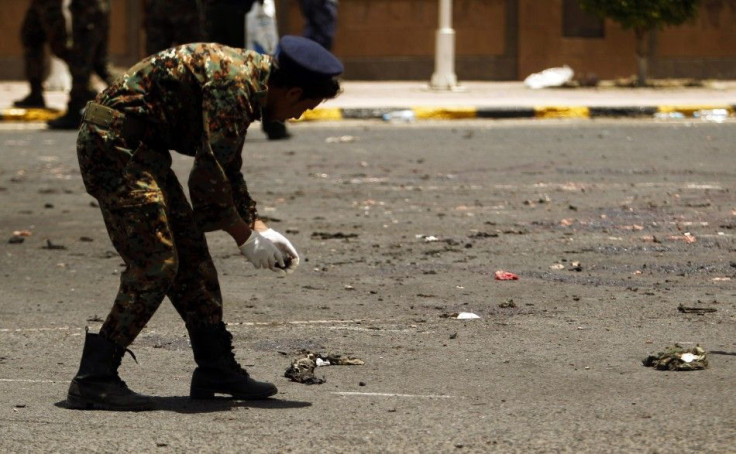Al Qaeda Statement Claims 'Revenge' After Suicide Bomb Kills Yemeni Troops In Sanaa

Al Qaeda has claimed responsibility for a suicide bomb in Yemen's capital city of Sanaa, saying the Monday attack, which killed at least 96 and wounded hundreds more, was revenge for military actions carried out by Yemeni and U.S. forces in the country's southern regions.
We will take revenge, God willing, and the flames of war will reach you everywhere, and what happened is but the start of a jihad project in defense of honor and sanctities, said the statement, which was received by Reuters but addressed to Yemeni military commanders.
The bomb went off during a military parade rehearsal. Yemeni troops were practicing in advance of a celebration for National Unity Day on Tuesday, a holiday marking the anniversary of the unification of South Yemen and North Yemen in 1990.
We were in a parade, suddenly there was a huge explosion. Dozens of our men were killed. We tried to help them, Col. Amin al-Alghabati told Reuters.
The suicide bomber was dressed in a military uniform. He had a belt of explosives underneath.
The BBC reports that most of those killed were members of the Central Security Organization. The disguised terrorist detonated his bombs just before Defense Minister Nasser Ahmed and Army Chief of Staff Ahmed al-Ashwal were scheduled to arrive; neither was injured.
The tragedy comes as embattled Yemeni President Abed Rabbo Mansour Hadi faces increasing pressure to suppress militant activities in his country.
Hadi assumed leadership in February after popular protests ousted former president Ali Abdullah Saleh. He is charged with overseeing a secure transition to democracy after years of autocratic rule, but has struggled to unify a country that is riven by deep divisions and political infighting.
The new Yemeni government has fought to suppress and contain terrorist activities in the south, engaging in air strikes and ground attacks to rout extremist infiltrators. Widespread discontent, combined with dire poverty and ongoing political conflicts, have made the rugged southern provinces a haven for extremists associated with al Qaeda in the Arabian Peninsula (AQAP).
The United States has been working with the new Yemeni government to suppress extremist activities and to prevent al Qaeda from establishing a secure base of operations in southern Yemen. Several covert U.S. drone attacks have been reported in Yemen within the last year, including an attack on May 17 during which three alleged militants were killed.
We are very concerned about al Qaeda activity and extremist activity in Yemen, said U.S. President Barack Obama during a Monday news conference at the NATO summit in Chicago.
We participate diplomatically along with Yemen's neighbors in helping to lead a political transition, but the work is not yet done. We have established a strong counter-terrorism partnership with the Yemeni government... We're going to continue to work with the Yemeni government to try to identify AQAP leadership and operations.
The AQAP statement on Monday warned that more attacks were imminent if military campaigns in southern Yemen did not cease.
© Copyright IBTimes 2024. All rights reserved.






















